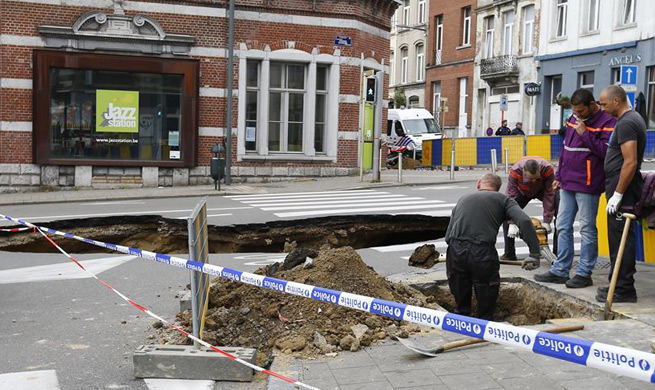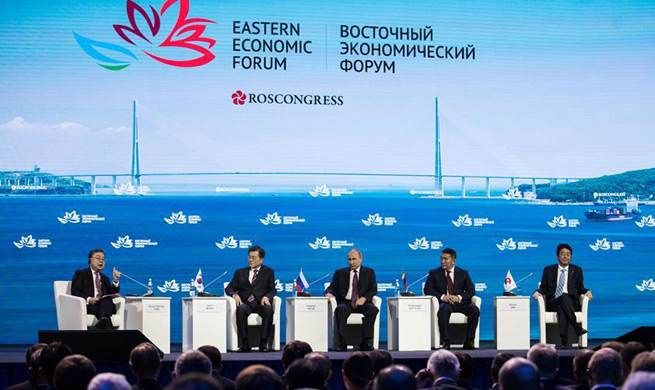ISTANBUL, Sept. 7 (Xinhua) -- As German Chancellor Angela Merkel announced she would propose to stop Turkey's accession talks at an upcoming EU summit, Turkish analysts are divided over whether the 28-nation bloc would end Turkey's membership negotiations, a prospect that would cost Ankara dearly economically.
Some feel that Merkel would not be able to convince all her EU partners to officially halt negotiations with Turkey.
"I don't think Merkel would be able to get all the 28 EU countries to accept her proposal," Can Baydarol, deputy chairman of the European Union and Global Research Association based in Ankara, told Xinhua.
Conceding that Germany is a heavy weight in the union, he added "there are countries and political groups in the EU which do not hold with Merkel's attitude."
Criticizing Ankara for moving away from the rule of law, Merkel said last Sunday that Turkey should not become a full member of the EU.
The German leader called for a joint stance in the EU, as the bloc needs a consensus to officially stop the accession talks.
Ankara applied to join the EU in 1987 and started in 2005 the negotiations for full membership, which have already been stalled over the past couple of years.
Turkey's relations with the EU have turned for the worse particularly after a coup attempt jolted Turkey in July last year, following which the Turkish government imposed a state of emergency.
Brussels has frequently criticized Ankara over what it called crackdown on dissidents, growing authoritarianism and violations of the rule of law.
"Merkel may have her way at the EU summit considering that over 40 percent of the EU budget is provided by Germany," Faruk Sen, president of the Turkish European Foundation for Education and Scientific Studies (TAVAK), told Xinhua.
France and Denmark have offered support to Merkel's proposal, arguing Turkey is moving away from democracy.
French government spokesperson Christophe Castaner said it is impossible to expect boosted integration with Turkey given the political situation in the country, while Danish Prime Minister Lars Lokke Rasmussen said it is meaningless to continue membership talks with Ankara as it is swiftly drifting away from European values.
Both countries also underlined that dialogue with Turkey should continue.
A statement by EU Foreign Policy Chief Federica Mogherini suggested, however, that the EU may not fully agree with Merkel on the issue.
A day after Merkel's remarks, the EU's top diplomat said the union is continuing to be in dialogue with Turkey, a candidate country.
Accession talks have their own specific criteria, she added.
"Even if Germany presses hard, there will be many in the EU that will oppose a formal break with Turkey," Faruk Logoglu, a former senior diplomat of Turkey, told Xinhua.
Turkish President Recep Tayyip Erdogan also claimed on Wednesday that some EU countries had started to raise their voices against Merkel's call, saying Germany cannot determine EU policy as it requires a consensus by member states.
Despite Mogherini's remarks, Sen, who previously headed the Essen-based Turkish Research Center when he lived in Germany for years, feels that Berlin could manage at least to have the accession talk freeze.
It is widely argued that Merkel's discourse may well be aimed at getting more votes in the elections to be held in Germany on Sept. 24.
Aversion to Turkey appears to have been on the rise among the German public as well as in some other EU countries as a result largely of the escalating war of words between leaderships.
The German chancellor's reference to the importance of ties with Ankara and the necessity to take a decision by consensus strongly suggests such an inference, Baydarol maintained.
"No European politician can resist the temptation of Turkey- bashing at the time of elections," stated Logoglu, "Turkish leaders with their equally vehement vilifications of Europeans provide ready fuel for this pointless tug-of-war."
The strain in Ankara-Berlin ties turned into a diplomatic crisis when Germany barred some Turkish cabinet ministers from addressing Turkish expats ahead of a referendum in Turkey in April on expanding the powers of the president.
Erdogan responded by accusing Berlin of adopting Nazism and fascism, which drew a harsh reaction from Germany.
Then in August, the Turkish leader called on Turks living in Germany to vote against Germany's leading parties, which he described as Turkey's enemies.
The remarks drew sharp criticism from German politicians, who saw them as an intervention in Germany's domestic politics, with Merkel calling them "absolutely unacceptable."
Back in July, the European Parliament voted in favor of a non-binding proposal calling on the EU countries to suspend membership talks with Turkey, should Ankara go ahead with constitutional changes to make way for a presidential system as endorsed in the April referendum.
The amendments have been much criticized at home and abroad for leading to a one-man rule while damaging the separation of powers.
European Commission President Jean-Claude Juncker warned in August that suspending the accession talks would be wrong, taking into consideration the EU's refugee deal with Ankara.
Turkey updated a refugee deal with the EU in March last year to prevent the flow of illegal immigration toward Europe in return for visa-free travel for its citizens, revival of its long-stalled accession talks and financial aid for refugees in Turkey.
The number of illegal migrants being smuggled into Europe via Turkey has fallen sharply as a result.
On Wednesday, Merkel seemed to further stiffen her stance on Turkey's membership talks.
Referring to some German citizens being detained in Turkey, she said there could be no question of continuing membership talks as Turkey is still violating the rule of law. Berlin said the arrest of some German citizens is politically motivated.
For Turkey, deterioration in ties with the EU and Germany may well take its toll on the Turkish economy.
If things continue to get worse, it may cost Turkey up to around 20 billion euros in economic loss, said Sen.
Germany introduced in July economic and military sanctions against Turkey, including steps that would hinder German investments in the country as well as measures that would partly block EU financial aid to Ankara and loans from the European Investment Bank (EIB).
Sen noted that loans Ankara is getting from the EIB have an interest rate as low as one percent on average.
The European bank provided a total of over 20 billion euros in loans to Turkey between 2007 and 2015.
If things do not get better, the EU may not allocate any money for Turkey as a candidate country in its budget for 2020-2026 either, warned Sen.
Many fear that Turkey's democracy would also be negatively affected by a breakup with the EU.
Aziz Konukman, a professor of economics at Ankara's Gazi University, believes that an official halt by the EU of membership negotiations could prove economically costly, as this scenario would create doubts about democracy in Turkey.
Not only investors from the EU, but those from around the world would be frightened away when there is no legal security in Turkey, he said, laying emphasis on the importance of democracy for economic growth.
It is argued that Turkey's link to the EU has been widely seen as its commitment to democracy, which has helped the country more easily attract direct foreign investments so far.
With a fast-growing population, low savings rate and huge current accounts deficit, Turkey desperately needs foreign investments for growth.
The economic loss Turkey would suffer due to concerns about its democracy following a breakup with the EU would be incomparably higher than the loss in EU financial aid, Konukman stressed.
"If the EU anchor is lost, then it almost becomes impossible for Turkey to be rated investable by international ratings agencies," he said.
The EU is both Turkey's biggest export market and investor as far as foreign direct investments are concerned.
Turkey's tourism sector would suffer as well from the crisis, as Europeans make up a big majority of tourist arrivals in Turkey and their number has already fallen considerably in the past two years.
Despite Erdogan's challenging speeches, Logoglu feels that Ankara would not abandon its EU membership bid as a strategic goal. He is expecting reason to prevail at the end of the day as "a formal break would have ruinous consequences for both sides."
On Sept. 7-8, Turkey's EU Minister Omer Celik was scheduled to meet with foreign ministers of EU countries in Tallinn, Estonia.
"As far as real politics is concerned, both sides need each other," stressed Baydarol.



















